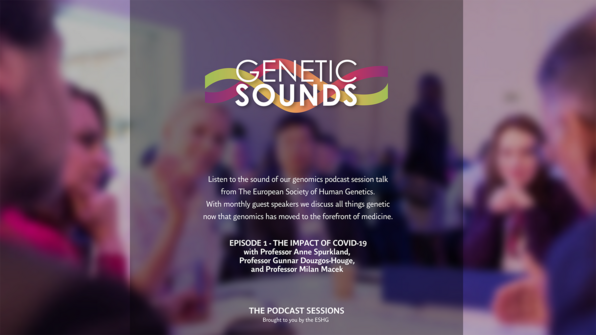Genetic Sounds
This colourful chat is brought to you by the European Society of Human Genetics and the Witworth Group. Listen to the sound of our genomics podcast session talks with monthly guest speakers.
Our podcast, seeks to stimulate new conversations around human genetics and bring you some of the biggest stories in science that affects us all.
Every first Friday of the month, we will be discussing all things genetic, now that genomics has moved to the forefront of medicine. What does that mean for everyone? Genomic Sounds is the ESHG podcast exploring themes close to our mind and heart.
This monthly countdown will peak with a live podcast during the ESHG 2022 conference in Vienna in June.
Episode 6 - What is the future in genetics?
In this final episode, we discuss the wide topic of “What is the future in genetics?”
Recorded with a live audience as one of the sessions at the 2022 European Society of Human Genetics conference in Vienna where we take questions from the live and virtual audience.
On the panel we have a wonderful range of guests including; Gijs WE Santen a clinical geneticist from the Netherlands with a special interest in dysmorphology, in particular Coffin-Siris syndrome, and prenatal genetic testing. Professor Clara Gaff, an Executive Director for Melbourne Genomics who has worked in public health, government, academic and not-for-profit sectors. Khadijah Bakur, a Genetic counsellor with expertise in understanding the role of religion -specially the role of Islam - on decision making for patients. And Alexander Hoischen, who has expertise in the identification of rare disease genes using latest genomics tools.
Episode 5 - Is your genetic information just yours?
In this episode, we debate “Is your genetic information just yours?”. We discuss where you find your genetic information if you need it, and who should have access to this. A conversation with Lawyer and bioethicist, Betina Cuñado, Associate Professor at the IHMPE in Toronto, Dr Yvonne Bombard, who specialises in the assessment and translation of genomic technologies in clinical care, and Dr Jantina de Vries, Associate Professor in Bioethics at the Department of Medicine of the University of Cape Town.
Episode 4 - What is a Genetic Syndrome?
In this episode, we discuss "What is a genetic syndrome?". We ask whether we still need ‘conditions’, or can we just have genes? A conversation with Leslie Biesecker, NIH Distinguished Investigator at the Center for Precision Health Research and Izzy Rundle, Engagement and Support Manager at SWAN UK (Syndrome Without a Name). Sofia Douzgou, from the European Society of Human Genetics also joins the conversation.
Episode 3 - Let's talk about access to genetic services
Bringing together the debate on access to genetic services, and discussing what can be done to improve the experience for individuals in need of these services. A conversation with Professor Dame Elizabeth Anionwu, founder of the Romanian Prader Willi Association, Dorica Dan, and Celia Azevedo Soares, Medical Genetics resident at Porto Medical Center, and a member of the Education Committee of the European Society of Human Genetics.
Episode 2 - Let's talk about sex in genetics
Bringing together the debate on gender and advances in knowledge about sex biases in human genetics.A conversation with Prof Gareth Evans, Professor of Medical Genetics and Cancer Epidemiology at The University of Manchester, Reubs J Walsh, a PhD Candidate in the Department of Clinical, Neuro- and Developmental Psychology at the Vrije Universiteit Amsterdam, and Dr Can Ding, Vice Chair of the ESHG Young Geneticists Committee (ESHG-Y).
Episode 1 - We could all be geneticists
In our first episode, we are joined by Professor of Anatomy, Anne Spurkland from the Institute of Basic Medical Sciences in Oslo, Norway, Professor of Medical Genetics at The University of Bergen, Norway, Gunnar Douzgos-Houge, and Professor Milan Macek, Chairman of the National Coordination Centre for Rare Diseases in Prague, Czech Republic.
We discuss the impact of current events linked to Covid-19, and why it is important for everyone to have basic knowledge about genetics.

